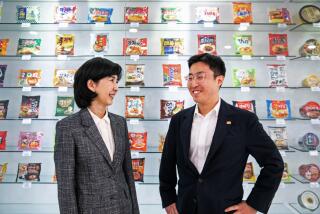South Korean retail rivals turn up the pressure
- Share via
Reporting from Busan, South Korea — It was a bold, in-your-face corporate strike underscoring the bad blood between South Korea’s two biggest retail titans.
In an Asian version of the old Macy’s versus Gimbels death match, Shinsegae Group last year opened its latest luxury department store on the home turf of archrival Lotte Group. Not just any new branch, this was a monster retail space that eclipsed Macy’s New York City flagship store in the Guinness Book of World Records as the world’s largest department store.
The $600-million, 5.5-million-square-foot colossus features an indoor ice rink, spa, concert hall, golf driving range and rooftop green space — a futuristic retail palace that dwarfs a Lotte store situated literally next door in urban Busan.
To hear Shinsegae officials tell it, Lotte founder Shin Kyuk-ho quickly organized an entourage to eyeball his competitor’s newest creation.
“He appeared angry and shocked,” recalled An Yong-joon, a general manager of customer strategy at Shinsegae Centum City. “For his whole life, he’s dreamed of building a piece of landmark international architecture here. And Shinsegae beat him to it.”
Not so fast, said Lotte, which is building its own new megaproject in Busan. Its Lotte World features a Bellagio-style water fountain that the store calls the world’s largest. Capping the venture is a skyscraper that when opened in 2016 will be among Asia’s tallest.
With a sniff, Lotte brushes off the competition posed by its adversary’s new superstore. “It may be big, but its sales are small,” said spokesman Lee Kyeong-kill.
Even in South Korea’s hardnosed corporate landscape, this battle stands out — because with Shinsegae and Lotte it’s not just business, it’s personal. Their take-no-prisoners tactics have included price and turf wars, accusations of unethical business practices, even lawsuits.
Now, with the emergence of two second-generation company leaders, the sales war threatens to go global as both retail giants expand into China and the rest of Asia.
“It’s competition on a very personal level,” said Lee Suk, an investigative reporter who has covered the companies for the weekly South Korean news magazine Sisa Journal. “They play by emotions. It’s become a battle of wits in the boardroom.”
Industry insiders said the in-your-face maneuvers illustrated the sheer chutzpah required to remain competitive in this business-savvy nation of 50 million.
“They fight like cats and dogs because they both have big egos, run by rich families who aren’t used to losing,” said an investment analyst who asked not to be named because of the sensitivity of the competition. “They’re two big players in a very small country.”
The companies have pursued different paths to the top. The foundation of Lotte’s empire is its high-end department stores, a segment where it claims three times the market share of Shinsegae.
Conversely, Shinsegae — whose name means “new world” in Korean — has targeted lower-end shoppers with its E-Mart stores, South Korea’s largest chain of Wal-Mart-style discount stores. That venture claims three times the lower-end retail market share that the Lotte Mart discount chain attracts.
The two companies are also preparing to do battle in a third category: outlet malls. Shinsegae already operates one and is planning several more in South Korea, while Lotte is now building its first.
Long second fiddle to Lotte, Shinsegae last year overtook its rival in total revenue, posting $11.4 billion in sales, compared with Lotte’s $10.7 billion.
“In terms of prestige, Shinsegae is catching up. They’ve opened the new department store in Busan, but it’s the discount area where they’re really winning,” said Gene Park, a broker at Woori Investment & Securities in Seoul. “Koreans now tend to prefer discount stores and that’s Shinsegae’s strength.”
And while Shinsegae has fallen short of financial targets it set for its expansion into China, Park said that such investments usually take years to produce dividends. After that, he predicted, Lotte had better watch out.
The fight has moved into the second generation, as sons of the founding families have ascended to key leadership positions.
At Shinsegae, Chung Yong-jin, 41, was promoted last year to chief executive. Shin Dong-bin, 55, Lotte’s vice chairman, is accelerating his move to take over the company as he directs Busan’s Lotte World project, industry insiders say.
“The personal animosity has risen with the sons,” Lee said. “They’re throwing punches to show their mettle and prove they’ll both be good CEOs.”
Neither Chung nor Shin responded to requests for an interview. Still, both go to the mat, customer by customer. When one company opens a new branch, the other soon follows with a branch nearby. Trouble has often ensued.
In 2009, Shinsegae contracted with a developer to purchase land in Paju, a town north of Seoul, for a new discount outlet. Lotte claimed it had already struck a deal with the developer on a 20-year lease on the tract and was negotiating an outright purchase.
Shinsegae wouldn’t budge. Lotte, which later sued the developer, called its rival’s move “unethical,” sniping in a public statement that it hopes “the competitor continues fair play.”
Months later, the two companies squared off over prize giveaways to customers. Shinsegae raffled off shopping sprees collectively worth $10 million. Not to be outdone, Lotte offered gifts that included a spaceship ride, a $500,000 apartment and trips to the North and South poles and Europe.
Then came this year’s “10-won war,” named for the South Korean currency, the won. Shinsegae fired the first shot when its E-Mart announced it would permanently cut the price of a dozen key products — from bananas to laptops — by up to 36%.
When Lotte responded by offering some items at prices lower than those at E-Mart, Shinsegae cut prices on 10 more items. Lotte then offered to beat the price on any Shinsegae product by 10 won, or about a penny.
Some shoppers said their choice went beyond lower prices and perks to include an intangible: company devotion.
“There’s definitely a loyalty factor going on. In my case, I go to Shinsegae because, depending on my shopping pattern, they’ll give me gifts like discount coupons and free parking cards,” said Kim In-kyung, a 38-year old homemaker in Seoul.
The domestic retail rivalry is spreading overseas. Shinsegae operates 26 discount stores in China and plans to open 100 outlets there by 2015. Lotte runs 79 discount stores in China and also has outlets in Indonesia and Vietnam. This year, Lotte expanded its presence in Russia by opening a hotel adjacent to a high-end department store it founded in 2007.
Yet the fiercest fighting is taking place in Busan, where media reported that Lotte took “personally” Shinsegae’s invasion of its home turf.
The challenge was audacious from the start. In 2004, Shinsegae officials attended a public auction of the land on which the company planned to build its store. Lotte officials also had designs on the property. Shinsegae insiders said their company’s strategy was to beat out Lotte by waiting until the last five minutes of the bidding to make their move.
Since its opening, Shinsegae’s Centum City store has been featured in a National Geographic documentary, and the edifice continues to dazzle customers.
Lotte officials, however, remain unimpressed.
“They’re newcomers who tried to make noise by poking our sides,” Lotte’s Lee said of his rival. “But they’re still minor players in Busan — all bark and no bite.”
Kim is a researcher in The Times’ Seoul Bureau.
More to Read
Inside the business of entertainment
The Wide Shot brings you news, analysis and insights on everything from streaming wars to production — and what it all means for the future.
You may occasionally receive promotional content from the Los Angeles Times.











